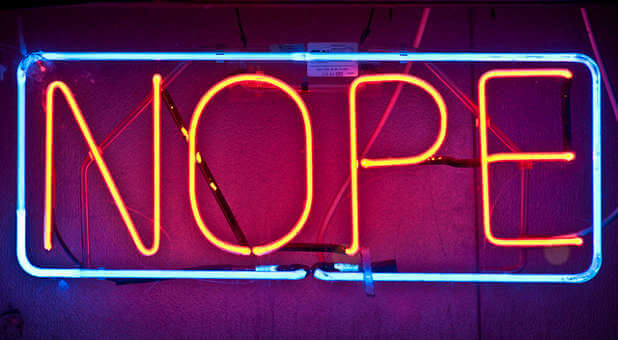Just about everyone has heard of Norman Vincent Peale’s The Power of Positive Thinking. Since it was first published in 1952, this self-help classic has sold some 20 million copies in 42 languages.
For more than half a century untold millions have been transformed by this book, including me. My maternal grandmother introduced me to Peale’s writings in my teenage years, and the positive effects remain with me to this day.
Yes, there is a power in positive thinking. There is also a power in negative thinking. No, I am not referring to the dangers of being a negative thinker. I am instead referring to the positive effects of saying “No.”
Winston Churchill used to quote Alexander the Great who said, “The Persians would always be slaves because they did not know how to pronounce the word ‘No.'”
Yes, there are times we must learn to say “No.” Accentuating the negative can be enormously positive. Life is made up of these kinds of choices. Here are two examples:
1) Right vs. Wrong
These decisions are usually obvious. Debate is not necessary. We know the catastrophic consequences if we place a toe over certain lines. One stupid decision can ruin an entire life. Then, saying “no” is extremely positive.
From the Garden of Eden to the book of Revelation, the Bible challenges the reader with the power of negative thinking. Over and over God declares the benefits of saying “no” to sin. Again and again the Bible documents our notorious habit of ignoring God’s prohibitions.
Adam and Eve ate the fruit. Cain killed Abel. Noah’s generation was wicked. Disobedient people built a tower. Abraham lied. Isaac lied. Jacob was a deceiver. Judah committed adultery. And that’s just the book of Genesis.
We can go on. Israel doubted God. Moses struck the rock. Achan took what was not his. A whole generation arose that did not know God and they did “that which was right in their own eyes.”
What more could we say of Eli, Saul, Solomon, Jereboam, Manasseh, Jezebel, Judas, and Ananias and Sapphira. The list could go on and on.
Lest one becomes discouraged, however, another list could also be complied of those who, with God’s help, exercised the power of negative thinking. They said “no” to that which displeased God. Noah, Abraham, Isaac, Joseph, Moses, Joshua, Deborah, Gideon, Samuel, David, Hezekiah, Daniel, the three Hebrew youths in the furnace, Peter and Paul. They, along with scores of others, show us how possible it is to say “no” to sin.
Perhaps the greatest example of the power of negative thinking took place in the Garden of Gethsemane when Jesus prayed for relief with “Take this cup from me” but concluded with “Yet not what I will, but what you will” (Mark 14:36). The power to say “no” to His own will became the greatest positive power in the world.
Without exaggeration, our entire eternal destiny was dependent upon those two choices of those two men in those two Gardens. The first Adam and the second Adam responded differently to the power of negative thinking. One choice resulted in our condemnation and the other resulted in our salvation.
2) Good, Better vs. The Best
Some choices can get very complicated because principles are involved and we must decide between the good, the better, and the best. Priorities matter. I may be concerned with developing a career or running a marathon or acquiring a degree. How do those priorities blend with other life priorities?
Rather than explicit biblical imperatives to guide these choices, we must look rather to Biblical principles. For example, consider the principle of excellence. II Corinthians 8:7 says, “But just as you excel in everything—in faith, in speech, in knowledge, in complete earnestness, and in love for us—see that you also excel in this grace of giving.”
Excellence. Now that is a challenging principle. We can strive for the good, the better or the best but what does that mean? Absolute definitions are often impossible yet the Bible clearly expects choices that move us to “excel in everything.”
That kind of priority can never be cultivated without discipline. In his book Alternative to Futility, p. 88 (1948) Elton Trueblood eloquently states, “Any man can pull a bow over violin strings, but it takes years of restraint on fingers and ear to make really excellent violin music when the bow is drawn … The price of excellence is discipline and the continuance of discipline.”
Jim Collins begins his well-received book Good to Great with these words, “Good is the enemy of the great.” He goes on to say that we don’t have great schools, great government, or even great people because we settle for having good schools, good government and good people.
I remember some years ago when I was research deep in my Ph.D. dissertation at the University of Minnesota. Needless to say, my schedule was full and running over. Frequently my sons would ask, “Dad, can we go play tennis?” I had my academic goal to finish in five years. I was also working full time. I was focused and immersed in the tasks at hand. To what should one say “no”?
Previously a friend told me, “There are a lot of good things that need to be done in the world, but you can’t do them all.” To this day, I do not regret taking seven years to complete my degree rather than to sacrifice my best years with Darin and Kevin.
Pecan pie is good, but is that best if I’m trying to lose weight? Watching a favorite TV program or playing a video game may be good, but is that best if I’ll have no time for reading God’s word? Making lots of money by working overtime may be good but is that best if it will cause me to lose touch with my spouse?
The power of negative thinking. The gardener says “no” to the wrong plants (weeds) and grows a horticultural masterpiece. The author says “no” to the wrong words and writes a literary masterpiece. The sculptor says “no” to the unnecessary stone and carves an artistic masterpiece.
Even Norman Vincent Peale’s wife said “no” to him. Peale was in his 50s when he wrote his famous book and had received nothing but a stack of rejection slips. Dejected, he threw the manuscript into the wastebasket, and forbade his wife to remove it. She took him literally, the next day presenting the manuscript inside the wastebasket to the publisher who ultimately bought it. The rest is history.
As a final note, we should always remember that the ultimate reason for exercising the power of negative thinking is our own good. Deut. 5:29, “O, that their hearts would be inclined to fear me and keep all my commands always, so that it might go well with them and their children forever” (emphasis added). God always knows what is best.
The power of negative thinking. Learning to say “no” may be one of the most positive things we could ever do.
Don Meyer, Ph.D., is president of the University of Valley Forge in Phoenixville, Pennsylvania, as well as a prolific writer and speaker, including ministry in more than 25 countries. He also is an ordained Assemblies of God minister and pastored a church in Franklin, Pennsylvania for seven years. Before coming to Valley Forge in 1997, Dr. Meyer was a professor and administrator at North Central University in Minneapolis for 21 years. Responses can be emailed to [email protected]. Follow him at facebook.com/DrDonMeyer or on Twitter: @DrDonMeyer.
































































